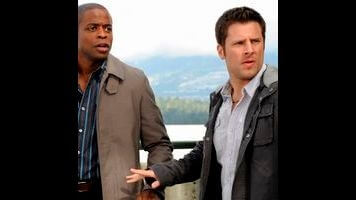I’m starting to think that I would be a lot happier if I didn’t watch the final five minutes of each Psych episode, the time when the case has already been solved, and the bit of the overarching season plot teased out during the episode reaches its emotional resolution. When this involved advancing the romantic plotline between Shawn and Juliet, these moments felt like little bonuses to the part of the audience that followed Psych for the will they/won’t they factor. But now, as those segments focus on Shawn and Juliet’s romantic problems, stemming from Juliet’s discovery that Shawn isn’t a psychic and has been lying for years, it’s getting away from the show’s strengths. Psych is at its best when it ignores this seriousness and embraces the Scooby-Doo of it all, with red herrings and reversals and Perry Mason-esque final monologues detailing all the evidence that leads to a captured suspect.
After the death of the universally-liked mayor of Santa Barbara—well, almost universally-like, since Lassiter seems to the be the only holdout—Shawn and Gus suspect the head of the City Council, who assumes the mayor’s position by default. In order to keep him out of the seat and stalled while they investigate, Shawn begins a fake campaign for mayor, which he then takes seriously when polls show he has a sizeable lead, then intentionally tanks the race after the evidence clears the head of the City Council. It’s a typical Psych plot, with misidentified suspects, sudden discoveries or revelations with new evidence, culminating in a final, public, twist-heavy conclusion.
In the middle of the episode, at a gala event during the special election campaign, Shawn dances with Juliet, revealing to her that after ditching dance classes with her at some point in their relationship to go to a convention with Gus, he felt so guilty that he went back and took the dance class by himself. He messed up learning to dance with his girlfriend, and then made it up somehow by again not participating in a dance class with his girlfriend, only useful in a surprise setting. Somehow this overwhelms Juliet emotionally, and in the ensuing private conversation, she delivers the key demand: Shawn has to tell Chief the truth about not being a psychic. He predictably refuses, and throughout the episode, as he shares his “visions” with everyone else, he and Juliet exchange glances, more silent admonishment from Juliet.
But once Shawn gathers himself, after only the slightest indication he’s changed his mind, he walks into the station in the last five minutes, ready to come clean. Seeing this, Juliet is suddenly gripped by fear, and arbitrarily prevents Shawn from potentially ruining the department. Demanding Shawn admit his series-length lie, then intervening to jump on the grenade, only accomplishes one thing: it lets Shawn off the hook for all the things he’s done wrong in the name of “greater good.” Juliet says she initially thought Shawn was acting selfish (he was), but then realized her demands were selfish—but that demand is only selfish insofar as it deals with her ingrained trust issues stemming from her father. It’s not selfish to want a perpetual and methodical liar to admit his wrongdoing and take responsibility for his actions.
Shawn pretends to be a psychic, lies about it to his coworkers and his ex-girlfriend, and is punished by having his ex-girlfriend stop him from telling the truth, and then remind him they’re broken up in a scene that heavily suggests the barrier to getting back together is easily surmountable. This is a guy who interrupts the mayor during a speech, belittles the contributions of the police chief and other officers while gloating and taking as much credit as he can for himself. Shawn’s actions in public are self-serving and arrogant, and one almost-confession doesn’t change that.
No matter what happens, Shawn doesn’t have to change, because those around him will accommodate him for his abilities. He doesn’t learn anything through Juliet’s unenforceable demand, except that deep down she’s willing to enable his lies and showboating. It’s for the betterment of the city, but it’s also self-preservation—though in a show as dependent on comedy as this one, even if the truth comes to light, I have a hard time believing the department would clean house.
All of this adds up to far too many machinations over the fundamental premise of the show, injecting emotional chaos where there is no need for it. The simple brush-off explanation would do, with everyone admitting to knowing Shawn isn’t psychic and simply playing along because his methods worked. That’s my biggest problem with the last five minutes of nearly every episode this season: it heightens the drama of an element of the show that didn’t need this elevated treatment. In a world where Shawn has become the most valuable asset to a police department patrolling the crime-ridden streets of sunny Vancouver, I mean Santa Barbara, the foundational lie of the pilot would be better served by a comedic solution, instead of one that tries to wring out romantic drama as a stall tactic.
Stray observations:
- Though it doesn’t have any bearing on the rest of the episode, it would be criminal to omit the brief walk-and-talk exchange where Dule Hill references The West Wing and says “Mr. President,” over and over. Even as someone who thinks of the show as more hit-or-miss than the Sorkin acolytes, that was damn cool.
- Another excellent reference: to Philip Seymour Hoffman’s hilarious character in Along Came Polly.
- Possible alternate slogan for Pawnee, Indiana: “This is where Rob Lowe humps it out.”








































